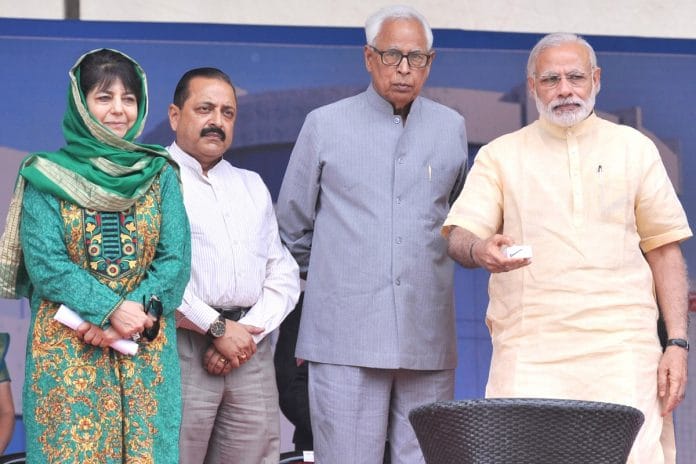There are many similarities between the two NDA governments in the appointment of an interlocutor for Kashmir. NDA-2 was waiting for winter when infiltration is low.
The Centre’s decision Monday to appoint Dineshwar Sharma as an interlocutor for Jammu & Kashmir is driven by the precedent of current Governor N.N. Vohra being appointed interlocutor by the NDA government of Atal Bihari Vajpayee.
Both decisions have a logical connect to similar approaches outlined by the two prime ministers in their Independence Day speeches – Vohra was appointed in February 2003 after Vajpayee’s speech in August 2002; Sharma has been appointed two months after Prime Minister Narendra Modi’s speech in August when he said Kashmir cannot be solved by bullets.
The guiding principles, ThePrint has learnt, are also somewhat similar. First, to have a dialogue process that is a step removed from the political dispensation. Next, it should be led by a government official who is seen as non-partisan and is sufficiently empowered.
Vohra was a former home secretary when he took charge as interlocutor in 2003, just as Dineshwar Sharma, the new interlocutor, is former head of the Intelligence Bureau. The Manmohan Singh government made Vohra J&K governor in 2008.
Like in the case of Vohra, informed sources told ThePrint that the Modi government has accorded cabinet secretary status to Sharma with a mandate to talk to all groups with no explicit red lines. But the focus for Sharma will be to address the issue of radicalisation among the youth.
The political backdrop was equally intriguing. The People’s Democratic Party under Mufti Mohammed Sayeed, father of present CM Mehbooba Mufti, had come to power for the first time in 2002, although in alliance with the Congress. He had been demanding a more robust dialogue with Delhi.
The current J&K CM, just like her father in 2002, has been asking the Centre to initiate a dialogue to regain some confidence. Government insiders told ThePrint that this has been under discussion for close to a year and it was felt that the best time to launch such an effort would be post-Diwali, during the winter months when infiltration is at its lowest.
While it was agreed that the interlocutor should be a step removed from the political layer, the decision was also to project it as part of a “multipronged strategy” on Kashmir that involves hard security measures like ongoing investigations against Hurriyat leaders.
The big difference, however, was that the Vajpayee government wanted to exploit what then Deputy PM and Home Minister L.K. Advani had described as a “window of opportunity” arising from the 2002 elections. Which is why Vohra had a specific task within the larger mandate to engage with elected representatives of the state.
Now the Modi government is trying to keep the worsening political situation in the Valley under control given that this time it is the BJP which is in alliance with the PDP.







There is no perfect moment to wait for before starting a dialogue. One hopes there will be a similar outreach to Pakistan.